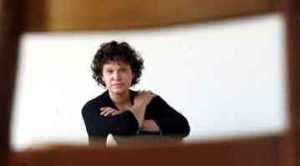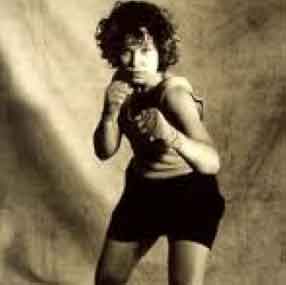by Andreas Suranto
The 18-year-old girl staring into the mirror saw a young woman she did not recognise. Life had not been gentle to her and her infant daughter. Her alcoholic mother had just died and her father was never around in the first place. She suffered domestic violence in relationships to the point the beatings became normal occurrences. In her despair, she listened to a voice at the back of her head she later thought to be that of her mother, “What about your acting?”
Leah Purcell sits in her office in UTS on a sunny morning. Framed photographs sit neatly on the shelf, accompanied by trophies and awards. The acclaimed actress, playwright, director, and writer wears an orange dress with Aboriginal art motifs and an opal bangle on her left wrist. Her smile is wide and her eyes shine with energy. When she speaks, her arms move around with excitement. She laughs freely.
If Leah looks in the mirror now, she recognis herself. She recognises the person in the mirror who chased a dream, and grasped it in her hand.
Born to Aboriginal mother and Caucasian father, Leah always has a passion for acting and performing. “Acting had always been my dream. It’s my drug,” she says. She believes that acting and performing is in her family’s blood. That it is a gift from her ancestors. “My mum was a great singer. She could tell a joke and tell a story,” she says. “I was just born at the right time when I could actually do something with my gift.”
Her mother was one of the stolen generations. “She lived under oppression. She left school at fourth grade and set to work as a housemaid,” she says. “In a sense, she was not allowed to express herself.”
In Murgon, Queensland, a town where everybody knew everybody, her mother had six children with Leah’s father. A father who had another family. A father who was never around, leaving her mother to find comfort in the bottle.
Under the circumstances, Leah was always convinced that she was not going anywhere, that her dream to be a dancer in a theatre was only childhood’s fantasy. It was accepted in Murgon that children of her age were either going to be a nurse or work in abattoir.
“I was not meant to succeed. I am from the bush. I am Aboriginal. And I am a woman,” she says, “but somewhere in me, there was a drive to chase my passion.”
That was when she packed her luggage, took her one-and-a-half year old daughter on her shoulder, and hopped on a bus to Brisbane. But while she left her mother’s house, she believed her mother’s spirit was with her.
“I put myself out there, believing something good would come along,” she says. “I took the risk.”
She later put her story in a play entitled Box the Pony, a tale of her life and her family. “Box the Pony is a one-woman show where I play 15 different characters,” she says. With one character, she plays her crippled grandmother who was bedridden with arthritis and Parkinson’s Disease. With another character, she plays her mother dealing with drinking and loneliness. And she plays herself struggling with domestic violence.
Leah believes that her stories relate to many people, especially Indigenous Australians. “The story in Box the Pony is universal, but from Indigenous perspectives; I want them to connect with the issues,” she says.
She also wrote Black Chicks Talking, a documentary film and a book based on life stories of Indigenous women. Leah says she finds writing personal stories of others harder than writing her own. “I felt so rude because I had to dig deep to pull out the dramas in their lives,” she says. “But then, as a young women said, we need to hear the voice of contemporary Indigenous women, and how we get by.”
Leah says that being able to share and touch people’s lives through her story is a gift. “The emotional drain and burden when you do personal stories is so rewarding when you touch people,” she says. “It is massive to receive an email from a white male, saying that he can relate to the story and it has changed his life.”
She believes that a higher power has always supported her. “I believe in spirits and ancestors,” she says, “When things got rough in the theatre, I would often go home and cry in my pillow, asking my mother if she is okay with the play.”
Leah believes that the higher power works in mysterious way, and there are signs in every moment in her life. And of her infant daughter, she says, “Amanda anchored me,” she says.
“All my life, I took a dive in the deep end,” she says. “I could sink or I could swim.” And it is clear, she is doing swimmingly well.

